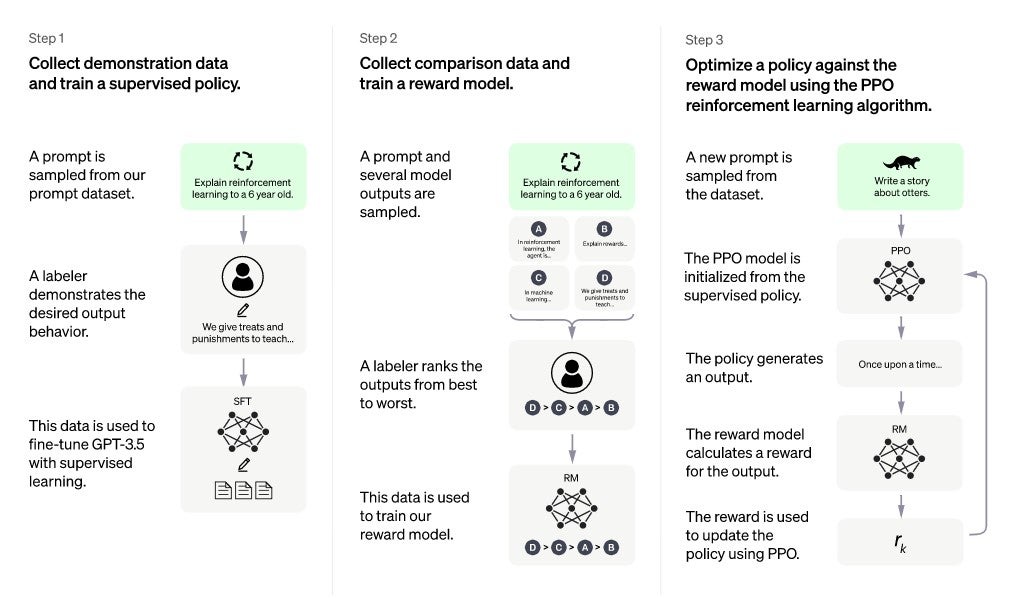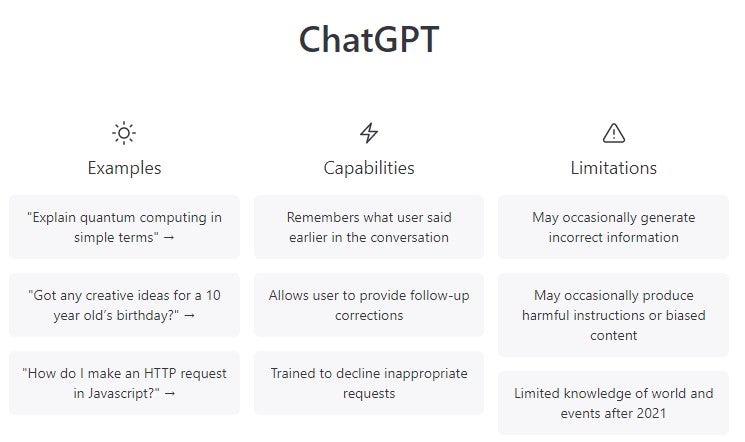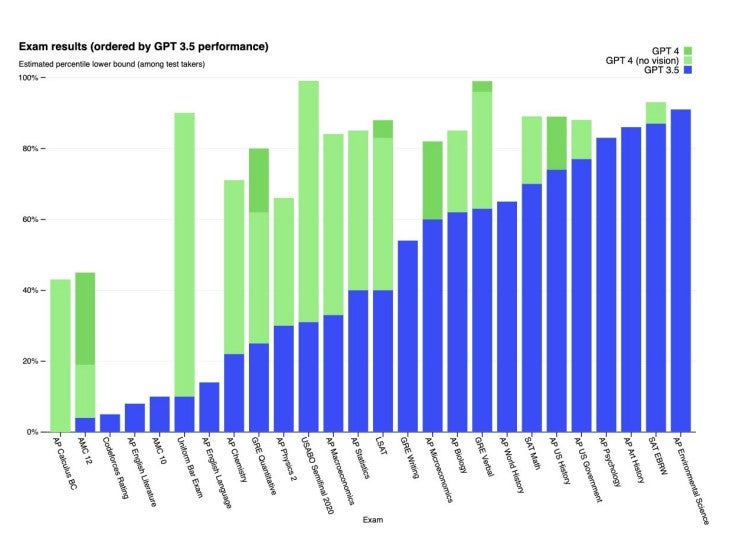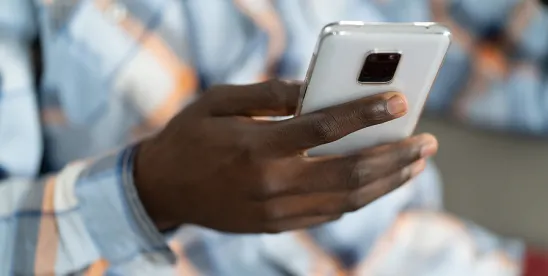In November 2022, OpenAI, a private artificial intelligence (AI) research laboratory and deployment company, introduced the world to its AI-enabled chatbot ChatGPT, leaving an indelible mark on the public and technology community, with the aim of benefiting humanity as a whole. It hit the world like a storm. Within five days of the platform’s initial release, the company drew more than one million daily users,1 and generated quite the buzz. Besides the publicity and energy behind the launch, what ChatGPT did was send shockwaves throughout the tech community and re-energized the belief in AI’s real-world applications.
With this release, OpenAI has garnered widespread attention both in the news and from the investor community. In late January, Microsoft, which has already invested US$3 billion into OpenAI, confirmed its commitment to continue its investment in the company with estimates of an additional US$10 billion investment to come,2 placing OpenAI’s valuation at US$30 billion.3
What is ChatGPT?
ChatGPT stands for Chat “Generative Pre-trained Transformer” (GPT) which is an AI large language model (LLM) that deploys deep learning and autoregressive (AR) modeling. AR modeling is simply a model that predicts a future outcome in a series or body of text based on previously observed outcomes of that sequence. The model uses prior learned outcomes to identify patterns in LLM datasets, and repeatedly predicts the next word in a set of text based on those patterns and groupings identified. The prior learning of the model is the result of the AI training method known as Reinforcement Learning from Human Feedback (RLHF). RLHF relies on frequent human supervision and training to reinforce and reward the most accurate conclusions of the models. Below is an infographic visualizing the process:

Image Source: “ChatGPT: Optimizing Language Models for Dialogue” OpenAI.
While the public often associates LLMs with various iterations of the GPT, LLMs can be trained using a range of architectures, and are not limited to transformer-based models4. LLMs can process and produce various forms of sequential data, including assembly language, protein sequences, and chess games, extending beyond natural language applications alone.
It is important to recognize that the ChatGPT chatbot does not actually “know” anything. Rather, it applies a finely tuned model to identify patterns, group words, and quickly predict outcomes based on a library of information, with the caveat that the information stored on the ChatGPT server is limited to knowledge of events through 2021. Even ChatGPT tells us that it has limited knowledge of the world and events after 2021.

A prompt of “what is your knowledge based from?” yields the following generated response: “as an AI language model, my knowledge is based on a large dataset of text from the internet, books and other sources.” Note, the training is constantly updated to ensure that ChatGPT has the most current information available.
For example, if you ask ChatGPT how many times Argentina has won the FIFA World Cup, you will get an answer of “two”, in 1978 and 1986. It does not account for Argentina’s recent World Cup win in 2022 in Qatar.
ChatGPT is not a new technology in many respects. It was built on the GPT models, specifically on top of OpenAI’s GPT-3.5 and GPT-4 families of LLM. GPT is a type of neural network that uses a transformer-based architecture to generate text. Further, GPT-3.5 is a model variant of GPT-3, which is a highly advanced language model developed by OpenAI. Each new iteration tends to be more efficient and cost-effective than its predecessor, while still providing a high level of language understanding and generation capabilities.
GPT-4, the latest milestone in OpenAI’s effort in scaling up deep learning, was released on March 14, 2023,5 and is made available via API and for premium ChatGPT users. GPT-4 is a large multimodal model, which allows it to accept image and text inputs, emitting text outputs, providing for a more interactive and immersive experience for the user.
A Panoply of Opportunity
ChatGPT is being heralded for the numerous applications and panoply of opportunities in a variety of industries and sectors. While this does raise concerns for those who fear AI job replacement,6 it is more likely (at least for now) that its application will lead to new collaborative work streams for AI-enabled human work.7 With just a few words typed into the prompt, ChatGPT can generate coherent text that feels authentically human in many cases, which means it can conceivably revolutionize many of the customer service chatbots in use today. It can also be used in a variety of research contexts to aid in the analysis and synthesis of thousands of texts in mere seconds. There is also a budding area of AI-as-creator opportunities with ChatGPT’s capabilities in artistic endeavors such as poetry, screenplay drafting, storytelling, and even journalism.
To date, the chatbot has shown promise in passing various standardized and master’s degree level tests in fields of medicine,8 law,9 and others, with limitations.10
Model capabilities are progressing rapidly. Consider the chart below that reflects the jump in exam performance between GPT-3.5 and GPT-4.11

That being said, the program still has some ways to go, performing at the level of mediocre student in most of these examinations and oftentimes arriving at the correct answer for incorrect reasons. Additionally, the chatbot still has difficulty answering very basic questions in certain fields like math,12 basic logical reasoning,13 and computer programming.14
Limitations, Risks, and Ethics
ChatGPT is far from perfect in generating outputs, facing a number of concerning limitations that create risks for users. The chatbot has been shown on numerous occasions to write “plausible sounding, but incorrect or nonsensical answers."15 In a recent study, it drafted fake scientific abstracts and papers that fooled reviewers nearly a third of the time.16 Others have highlighted its proclivity for manufacturing made up sources to cite when answering technical questions, with the bot going as far as to use real authors’ names associated with fabricated articles that do not exist.17 These “hallucinations” are common for chatbots and create a risk with fidelity to the truth and reliability of the information derived from their use.
ChatGPT is also limited by the common AI issues of bias and unknowable data inputs and outputs commonly referred to as the “black box problem.” The limited data through 2021 used by ChatGPT does not provide for a way to know whether the information relied on contains inherent biases. The potential of bias in AI is well documented and a point of contention when considering whether to use the technology, with critics of ChatGPT pointing to a potential political bias in the chatbots’ outputs.18 The issue of bias in the data is compounded by developers’ inability to understand what information is being relied upon and how the AI-informed decision making actually occurs. This is due to the large corpus of data, the speed of neural networks, and the reinforced learning (AI vs. AI) algorithms these systems operate on, resulting in a “black box” machine that users and developers are unable to truly comprehend. This inability to audit the data and understand the purpose behind the machine’s decisions poses a risk to users.
Additional ethical concerns have been raised in connection with how ChatGPT and chatbots will affect students. GPT is affecting how people learn. Educators around the world are raising concerns about the potential for these tools to undermine student learning and testing as many students are already admitting to using chatbots during coursework.19 The concern of chatbot-generated plagiarism may be short lived though, as AI-generated text detection tools like GPTZero are being developed with incredible speed and efficiency.20
Finally, the issue of copyright and IP ownership is also at the forefront of the debate. The library of information that ChatGPT queries when deriving answers is often copyrighted and owned materials, begging the question of who or what intellectual property rights are attributed to the chatbot’s output. This issue of AI authorship is not unique to ChatGPT, with other AI products like OpenAI’s DALL-E 2, an image generator, raising similar concerns about artistic creatorship and ownership.21
Just the Beginning
Despite their limitations, LLMs are becoming more and more popular and integrated into specialized applications in areas like writing assistance, coding, and legal researching, paving the way for businesses and individuals to adopt GPTs more widely and regularly.
The tech community is using ChatGPT to write web and mobile applications and to audit code. Creative users are even claiming that ChatGPT has built them businesses that make money.
2023 seems to be the year of AI. Human capacity will be pushed to new realms, we will interact with each other differently, ideas and efficiencies will be developed and implemented. Perhaps this is the start, or progression of, another revolution, as the previous tech revolutions that came before it. While we are in early stages of AI, already there have been demonstrated use cases of AI in marketing and sales, creating personalized marketing literature and commentary, operations, providing for efficient task lists, IT and development, and other areas where complex answers are answered.
The AI revolution is here.
AI can use AI algorithms to create unique and original pieces of art (with legal implications of ownership, of course). AI can be used to generate new musical compositions, analyze fashion trends, create more realistic game characters, create recipes and perhaps even help do your homework! Of course, there are ethical and plagiarism concerns associated with some of the use cases. ChatGPT is further limited and is not designed to do the following:
- Physical tasks
- Make or provide moral or ethical judgments
- Provide medical treatment or diagnosis
- Provide legal advice
- Predict the future
- Provide comments on subjective topics
- Counsel or provide emotional support
- Engage in hateful, malicious, racial or harassing behavior or speech, or illegal activities
ChatGPT may have taken the world by storm since its re-release on March 14, 2023, but its unaccompanied rise was just the beginning. Numerous chatbot competitors are entering the marketplace with Google’s Bard, Meta’s LLaMA,22 and Microsoft’s improved Bing search being just a few of the LLMs launched or announced in 2023.23 What will be the impact of ChatGPT and similar large language models? According to ChatGPT:
“Chatbots like ChatGPT will significantly improve the efficiency and accessibility of customer service and support, while also automating repetitive tasks in various industries, such as education, healthcare, and business, freeing up employees to focus on more complex work. Their impact has the potential to revolutionize the way we interact with technology, making information and services more accessible to a wider range of people.”24
1 Helms, Shawn and Krieser, Jason. “ChatGPT Will Unleash Copyright Chaos” Barron’s, 27 January 2023.
2 “Microsoft and OpenAI extend partnership” Microsoft, 23 January 2023.
3 Robbins, Jacob. “After Microsoft’s OpenAI play, a feast at the generative AI buffet” Pitchbook, 30 January 2023.
4 Devlin, J., Chang, M.-W., Lee, K., and Toutanova, K. (2019). Bert: Pre-training of deep bidirectional transformers for language understanding. ArXiv, abs/1810.04805.
5 “OpenAI. GPT-4 Release Announcement. 14 March 2023.”
6 Cerullo, Megan. “AI ChatGPT is helping CEOs think. Will it also take your job?” CBS News, 24 January 2023.
7 Book, Joakim. “ChatGPT Isn't Coming for Your Job (Yet)” Reason, 24 January 2023.
8 Kung, Tiffany et al. “Performance of ChatGPT on USMLE: Potential for AI-Assisted Medical Education Using Large Language Models” medRxiv, 21 December, 2022.
9 Sloan, Karen. “ChatGPT passes law school exams despite 'mediocre' performance” Reuters, 25 January 2023. and Choi, Jonathan et al. “ChatGPT Goes to Law School” SSRN, 25 January 2023.
10 Kung, Tiffany et al. “Performance of ChatGPT on USMLE: Potential for AI-Assisted Medical Education Using Large Language Models” medRxiv, 21 December, 2022.
11 GPT-4 technical report. Technical report, OpenAI
12 Von Hippel, Paul. “ChatGPT Is Not Ready to Teach Geometry (Yet)” Education Next, 4 January 2023.
13 Ansari, Tasmia. “Freaky ChatGPT Fails That Caught Our Eyes!” Analytics India Magazine, 7 December 2023.
14 Rose, Janus. “Stack Overflow Bans ChatGPT For Constantly Giving Wrong Answers” Vice, 5 December 2023.
15 “ChatGPT: Optimizing Language Models for Dialogue” OpenAI, Accessed 10 March, 2023.
16 Bushard, Brian. “Fake Scientific Abstracts Written By ChatGPT Fooled Scientists, Study Finds” Forbes, 10 January 2023.
17 “ChatGPT produces made-up nonexistent references” [Discussion Post], Y Combinator Hacker News, 3 December 2022.
18 Johnson, Arianna. “Is ChatGPT Partisan? Poems About Trump And Biden Raise Questions About The AI Bot’s Bias—Here’s What Experts Think” Forbes, 3 February 2023.
19 Westfall, Chris. “Educators Battle Plagiarism As 89% Of Students Admit To Using OpenAI’s ChatGPT For Homework” Forbes, 28 January 2023.
20 Bowman, Emma. “A college student created an app that can tell whether AI wrote an essay” NPR, 9 January 2023.
21 Ellison, Steven. “Who Owns DALL-E Images?” FindLaw, 29 August 2023.
22 Sundar, Sindhu. “Mark Zuckerberg just announced a new AI model 'LLaMA,' designed to help researchers make chatbots less 'toxic'” Business Insider, 24 February 2023.
23 Shakir, Umar. “Bing, Bard, and ChatGPT: AI chatbots are rewriting the internet” The Verge, Accessed 9 March 2023.
24 ChatGPT generated response when asked: “In two sentences: what will be the impact of chatbots like ChatGPT?” Accessed 25 February 2023.





 />i
/>i
